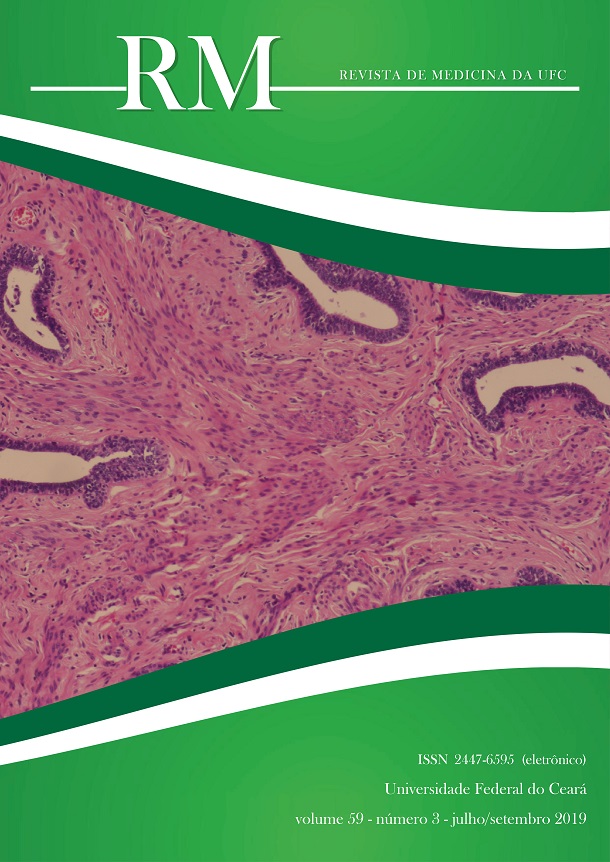Prevalence and factors associated with the generalized anxiety disorder among people living with HIV/AIDS in Brazilian outpatient clinics
DOI:
https://doi.org/10.20513/2447-6595.2019v59n3p32-38Palavras-chave:
Mental health, Anxiety disorder, Acquired immunodeficiency syndromeResumo
Introduction: The Generalized Anxiety Disorder (GAD) is a chronic worrying disorder, which causes social and occupational impairment. Objective: The aim of this study was to estimate the prevalence of GAD among people living with HIV/AIDS (PLWHA) and to determine the associated socio-demographic and clinical factors. Methodology: We conducted a cross-sectional study between September 2014 and April 2015 at four HIV outpatient clinics in Fortaleza, Northeastern Brazil. We surveyed 257 individuals living with HIV/AIDS, aged > 18-years, of both sexes. Four modalities of instruments were used to collect the data: a socio-demographic questionnaire; the Mini International Neuropsychiatric Interview; the Hamilton’s Anxiety Scale; and chart data. Results: GAD prevalence was 14%. Female sex, CD4 200-500 versus < 200, CD4 > 500 versus < 200 and being homeless were associated in the multivariate model. Conclusion: The study demonstrates the necessity of proactively addressing mental health as well as physical health issues in HIV+ individuals.
Referências
UNAIDS. AIDS by the numbers 2015. Geneva, Switzerland; 2015. Available at: http://www.unaids.org/sites/default/files/media_asset/AIDS_by_the_numbers_2015_en.pdf. Accessed March 7, 2017.
BRASIL. Boletim Epidemiológico: HIV/AIDS. Brasília; 2014. Available at: http://www.aids.gov.br/sites/default/files/anexos/publicacao/2014/56677/boletim_2014_final_pdf_15565.pdf. Accessed May 2, 2017.
UNAIDS. The gap report. Geneva, Switzerland; 2014. Available at: http://www.unaids.org/sites/default/files/media_asset/UNAIDS_Gap_report_en.pdf. Accessed April 7, 2016.
Pappin M, Wouters E, Booysen FL. Anxiety and depression amongst patients enrolled in a public sector antiretroviral treatment programme in South Africa: a cross-sectional study. BMC public health. 2012;12(1):244.
Robertson K, Bayon C, Molina J-M, McNamara P, Resch C, Muñoz-Moreno JÁ, et al. Screening for neurocognitive impairment, depression, and anxiety in HIV-infected patients in Western Europe and Canada. AIDS care. 2014;26(12):1555-61.
Treisman G, Angelino A. Interrelation between psychiatric disorders and the prevention and treatment of HIV infection. Clinical infectious diseases. 2007;45 Suppl 4:S313-S317.
Chandra PS, Desai G, Ranjan S. HIV and psychiatric disorders. Indian J Med Res. 2005;121(4):451-67.
Shacham E, Rosenburg N, Önen NF, Donovan MF, Overton ET. Persistent HIV-related stigma among an outpatient US clinic population. International journal of STD & AIDS. 2015;26(4):243-50.
Whetten K, Reif S, Whetten R, Murphy-McMillan LK. Trauma, mental health, distrust, and stigma among HIV-positive persons: implications for effective care. Psychosomatic medicine. 2008;70(5):531-8.
Bing EG, Burnam MA, Longshore D, Fleishman JA, Sherbourne CD, London AS, et al. Psychiatric disorders and drug use among human immunodeficiency virus–infected adults in the United States. Archives of general psychiatry. 2001;58(8):721-8.
Olagunju AT, Adeyemi JD, Ogbolu RE, Campbell EA. A study on epidemiological profile of anxiety disorders among people living with HIV/AIDS in a Sub-Saharan Africa HIV Clinic. AIDS and Behavior. 2012;16(8):2192-7.
van den Heuvel L, Chishinga N, Kinyanda E, Weiss H, Patel V, Ayles H, et al. Frequency and correlates of anxiety and mood disorders among TB-and HIV-infected Zambians. AIDS care. 2013;25(12):1527-35.
Simon N. M. Generalized anxiety disorder and psychiatric comorbidities such as depression, bipolar disorder, and substance abuse. Journal of Clinical Psychiatry. 2009;70 Suppl 2:10-14.
Newman MG, Llera SJ, Erickson TM, Przeworski A, Castonguay LG. Worry and generalized anxiety disorder: a review and theoretical synthesis of evidence on nature, etiology, mechanisms, and treatment. Annu Rev Clin Psychol. 2013;9(1):275-97.
Folstein MF, Folstein SE, McHugh PR. “Mini-mental state”: a practical method for grading the cognitive state of patients for the clinician. Journal of psychiatric research. 1975;12(3):189-98.
Amorim P. Mini International Neuropsychiatric Interview (MINI): validação de entrevista breve para diagnóstico de transtornos mentais. Rev Bras Psiquiatr. 2000;22(3):106-15.
Hamilton M. The assessment of anxiety states by rating. British journal of medical psychology. 1959;32(1):50-5.
Myer L, Smit J, Roux LL, Parker S, Stein DJ, Seedat S. Common mental disorders among HIV-infected individuals in South Africa: prevalence, predictors, and validation of brief psychiatric rating scales. AIDS patient care and STDs. 2008;22(2):147-58.
Schadé A, Van Grootheest G, Smit JH. HIV-infected mental health patients: characteristics and comparison with HIV-infected patients from the general population and non-infected mental health patients. Bmc psychiatry. 2013;13(1):1.
Matza LS, Morlock R, Sexton C, Malley K, Feltner D. Identifying HAM‐A cutoffs for mild, moderate, and severe generalized anxiety disorder. International journal of methods in psychiatric research. 2010;19(4):223-32.
Viana MC, Andrade LH. Lifetime Prevalence, age and gender distribution and age-of-onset of psychiatric disorders in the São Paulo Metropolitan Area, Brazil: results from the São Paulo Megacity Mental Health Survey. Revista Brasileira de Psiquiatria. 2012;34(3):249-60.
Morrison MF, Petitto JM, Ten Have T, Gettes DR, Chiappini MS, Weber AL, et al. Depressive and anxiety disorders in women with HIV infection. American Journal of Psychiatry. 2002;159:789-96.
Berger-Greenstein JA, Cuevas CA, Brady SM, Trezza G, Richardson MA, Keane TM. Major depression in patients with HIV/AIDS and substance abuse. AIDS patient care and STDs. 2007;21(12):942-55.
Shacham E, Morgan JC, Önen NF, Taniguchi T, Overton ET. Screening anxiety in the HIV Clinic. AIDS and Behavior. 2012;16(8):2407-13.
Palmer NB, Basinski JR, Uldall KK. Psychiatric illness, access and adherence to HAART: A brief review of recent findings and implications for care. HIV Therapy. 2010;4(2):215-30.
Panigrahi M, Swain TR, Mohanty S. Nonadherence to anti-HIV medication is associated with higher level of anxiety: Experience from a tertiary care hospital of Odisha. Indian journal of pharmacology. 2015;47(6):672.
Springer SA, Dushaj A, Azar MM. The impact of DSM-IV mental disorders on adherence to combination antiretroviral therapy among adult persons living with HIV/AIDS: a systematic review. AIDS and Behavior. 2012;16(8):2119-43.
Gaynes BN, Pence BW, Eron JJ Jr, Miller WC. Prevalence and comorbidity of psychiatric diagnoses based on reference standard in an HIV+ patient population. Psychosomatic medicine. 2008;70(4):505.
Abers MS, Shandera WX, Kass JS. Neurological and psychiatric adverse effects of antiretroviral drugs. CNS Drugs. 2014;28:131-45.
Els C, Boshoff W, Scott C, Strydom W, Joubert G, Van der Ryst E. Psychiatric co-morbidity in South African HIV/AIDS patients. South African Medical Journal. 1999;89:992-4.


